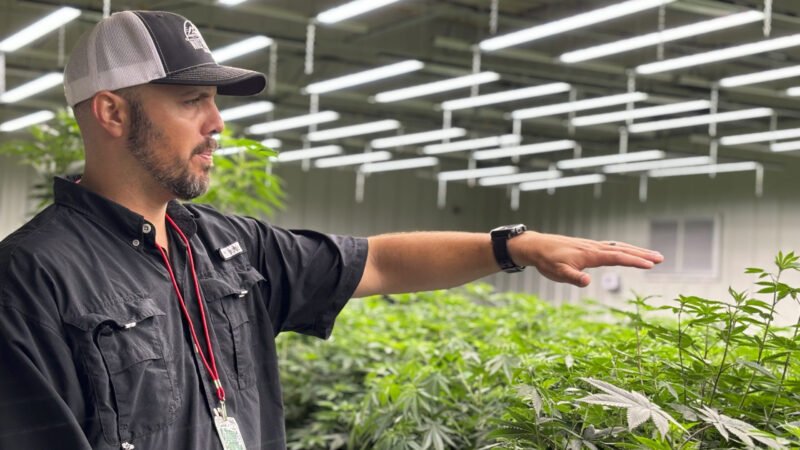Alabama approved a medical marijuana program in 2021. Patients are still waiting for it
Rob Levy, chief operating officer at CRC of Alabama, discusses the company's cultivation of marijuana plants in Pike County, Alabama on July 23, 2024.
MONTGOMERY, Ala. (AP) — When Amanda Taylor lived in Arizona, she used medical cannabis to relieve the symptoms of her multiple sclerosis, gastroparesis and other ailments. She returned to Alabama to advocate for medical cannabis in her home state.
Taylor thought victory was in view in 2021 when Alabama overcame years of resistance in the Deep South and approved a medical cannabis program. But three years later, medical marijuana remains unavailable in Alabama because of an ongoing legal fight over some of the licenses to grow and sell the products.
While licensed cultivators have marijuana plants nearing maturity, cannabis products can’t be recommended or sold to patients in Alabama while the entire program remains on hold. The delay is exasperating for patients like Taylor.
“It’s beyond frustrating,” Taylor said. “I’m a very calm person and … I’m always hoping for the best. But at this point, it’s anger because greed is causing so much more suffering.”
The Alabama Medical Cannabis Commission has issued licenses to cultivators, processors, and others, but licenses are on hold for five potentially lucrative integrated “seed-to-sale” licenses where companies grow, process, and sell cannabis as well as licenses for dispensaries that will sell the cannabis products. The entire program remains stalled while the dispute plays out in state court.
“We want to see the products out there for patients. Almost daily, we get phone calls from those concerned,” said John McMillan, director of the Alabama Medical Cannabis Commission. “That is the No. 1 question we get on our website by far. When are the products going to be available? And everywhere I go, if I speak to civic clubs, that’s the first question.”
The commission began accepting applications for licenses in 2022 and has attempted to award the licenses three times. The commission rescinded the awards twice after losing applicants raised concerns about the selection process. The panel adopted new rules and awarded licenses for a third time last December. But companies challenged the awards, arguing, among other things that the commission failed to follow the Alabama Administrative Procedures Act.
Montgomery Circuit Judge James Anderson on July 11 issued a temporary restraining order blocking the issuance of the five integrated licenses, saying there was a “serious question” whether the third round of awards was also invalid.
An attorney for Alabama Always, one of the companies that has pursued litigation after not winning an integrated license, said the commission by law should allow denied companies an opportunity to challenge the qualifications of winning companies.
“That’s why this has gone on for so long. They just simply refuse to do it the way it is supposed to be done,” Will Somerville, an attorney for Alabama Always, said of the commission.
But for companies that received licenses, the delay is frustrating after they have invested millions of dollars into operations that can’t get fully underway.
In an unassuming agriculture building, cloaked by fences and security cameras, 1,500 marijuana plants sprout skyward at a south Alabama facility operated by CRC of Alabama. The plants are about 60 days from harvest, said Rob Levy, chief operations officer for CRC of Alabama.
The plants, grown from varieties with names like apple blossom, hella jelly and blueberry pancakes, are moved through a series of rooms designed to mimic the growing season. The company has invested more than $2 million into the operation, including substantial security costs.
CRC plans to sell their product to one of the state’s licensed processors who will turn it into cubes and other products. But with the uncertainty surrounding Alabama’s program, it’s unclear when the products can get to patients.
“We are all dressed up with nowhere to go,” Grady Reeves one of the owners of CRC said. “But the ones that are really suffering are the patients.”
Dr. Marshall Walker, an interventional radiologist, said he believes medical cannabis could be beneficial for some of his patients with chronic pain. He said it’s “inhumane” that manmade problems are blocking its availability.
“The way I conceive of it, it really is just another tool for the toolbox,” Walker said. Walker said he became convinced of the potential benefit after seeing his mother use cannabis when she had esophageal cancer. It controlled her pain enough to allow her to eat.
A similar fight played out several years ago in Florida. Florida voters in 2016 voted to create a medical marijuana program, but litigation followed over a license cap.
As patients in Alabama remain waiting, more states have moved on to allowing recreational use. Twenty-four states have legalized recreational use of marijuana, according to the Pew Research Center. Florida voters will decide the issue this November.
When medical cannabis will become available in Alabama depends on what happens with the litigation, McMillan said. He said the issue will “hopefully” be settled by the end of the year.
“I don’t even use the word optimistic anymore. I just use the word hopeful because we don’t know how long these delays are going to continue,” McMillan said.
Light from satellites will ruin majority of some space telescope images, study says
Astronomers have long been concerned about reflections from satellites showing up in images taken by telescopes and other scientific instruments.
Defense Department is reviewing boat strike video for possible release, Hegseth says
In a speech on Saturday, Defense Secretary Pete Hegseth defended the strikes, saying: "President Trump can and will take decisive military action as he sees fit to defend our nation's interests."
Bama, Miami in, Notre Dame out and Indiana No. 1 in College Football Playoff rankings
Nobody paying attention for the past 24 months would be surprised to see Indiana – yes, Indiana – leading the way into this year's College Football Playoff.
McLaren’s Lando Norris wins first F1 title at season-ending Abu Dhabi Grand Prix
Red Bull driver and defending champion Max Verstappen won the race with Norris placing third, which allowed Norris to finish two points ahead of Verstappen in the season-long standings.
A ban on feeding pigeons ruffles lots of feathers in Mumbai
The pigeon population has exploded — a result of people feeding the birds. For some it's a holy duty and a way to connect to nature. Critics point to health risks tied to exposure to pigeon droppings.
UN humanitarian chief: world needs to ‘wake up’ and help stop violence in Sudan
The UN's top humanitarian and emergency relief official has told NPR that the lack of attention from world leaders to the war in Sudan is the "billion dollar question".








